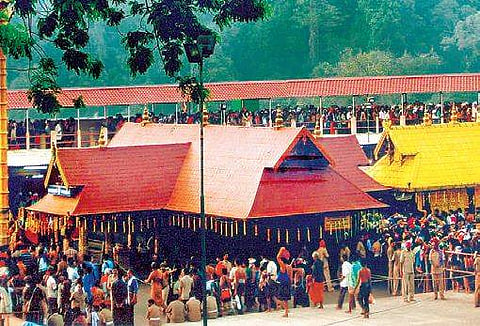

KOCHI: Will faith get prominence over gender equality when the Supreme Court decides on the review petition on the Sabarimala women's entry issue on Thursday?
A surprise may be in store as there are some important precedents when the apex court sets aside its earlier judgments, giving hope to Ayyappa devotees.
Legal experts pointed out that the power to review is not a routine process and it is used only in rarest of rare cases.
Justice V Chitambaresh, a former judge of the Kerala High Court, said judgment may be open to review if there is an error apparent on the face of the record and the apex court had reviewed its earlier judgment in several instances.
One such judgment is the Supreme Court's decision to recall its verdict concerning arrest under SC/ST Act. In March 2018, the Supreme Court had forbidden automatic arrest of an accused under the SC/ST Act.
It has partially recalled its verdict saying the fight for equality and civil rights of Dalits is not over yet.
The Supreme Court recalled directions which mandated prior sanction for the arrest of public servants and private persons.
It also did away with the requirement of preliminary enquiry before registering an FIR. In the case pertaining to cruelty against women, the Supreme Court had reviewed its earlier order.
ALSO READ: Sabarimala devotees tense as Supreme Court set to deliver verdict on November 14
A two-judge bench of the apex court had raised concern over the abuse of section 498 A (subjecting a married woman to cruelty) and directed that no arrest should normally be effected without verifying allegations as violations of human rights of innocents cannot be brushed aside.
The SC had held that a Family Welfare Committee should be constituted and it should verify the allegations. No arrest shall be made till such a committee has submitted its report.
However, the three-judge bench headed by then Chief Justice Dipak Misra reviewed the order and stated that there was no need for a committee.
The bench restored the powers of the police to act on complaints. The Supreme Court had recalled its judgment in the legality of IPC 377 (Unnatural offences).
In a landmark judgment, the Delhi High Court had decriminalised sex between consenting adults of the same gender holding the penal provision illegal in 2009.
However, the High Court's judgment was overturned by the Supreme Court in 2013.
In 2018, a three-member Bench heard a petition seeking to revisit the judgment, and the Bench referred the matter to a larger Bench and sought the assistance of the union government.
The larger Bench had ruled that homosexuality was not a crime, saying sexual orientation is natural and people have no control over it.